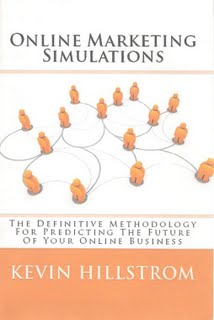Paid Search: Low Long-Term Value?
 Get your copy of Online Marketing Simulations via Amazon.com.
Get your copy of Online Marketing Simulations via Amazon.com.Paid Search is an absolute enigma, folks.
Talk to online marketing experts, and it is truly a big deal, the primary way many online brands acquire new customers.
Talk to offline marketing experts, and you hear a common theme ... "paid search customers have poor long-term value."
Long-term value is a relative term, comprised of two components ... "involuntary expense", and "voluntary expense".
Voluntary Expense includes all outbound direct marketing expenses that work for/against long-term value. Catalog marketers often begin to send paid search customers a veritable plethora of catalogs. If the paid search customer has no interest in catalog marketing, long-term value is going to decline, rapidly. The marketer is making a voluntary choice to speak with the customer, impacting long-term value.
Involuntary Expense happens after the customer is acquired. If a paid search customer elects to use paid search in the future, the brand experiences "involuntary expense". Sure, the brand could choose to not participate in paid search, but if the brand does participate, expenses are rung up in an involuntary manner, essentially controlled by the customer.
Marketing Executives use Online Marketing Simulations to understand how the customer is likely to migrate and change in the future. Simply isolate the paid search customer, and then see which channels the customer is likely to purchase from over the next five years. You can literally tally-up the offline advertising expense you'll incur, and the paid search expense you'll incur.
If you find that paid search customers are unprofitable, eliminate voluntary expense (i.e. offline direct marketing that you control). You may find that paid search customers have low long-term value only because they don't want to be marketed to with offline direct marketing activities. You may also find that paid search customers who purchase specific items have lower long-term value, or that non-branded terms have lower long-term value, as an FYI.
For those of us managing businesses where we do a lot of outbound marketing (post cards, catalogs, e-mail), long-term value is controllable. It is perfectly acceptable to acquire a paid search buyer that generates $5 of long-term value, and it is perfectly acceptable to acquire a customer via postcard marketing that generates $50 of long-term value. It is how we manage the long-term value that matters! Heck, let's go find ten of the paid search buyers and just deal with the subsequent value difference.
Most important, use Online Marketing Simulations to understand the long-term value of all customers from all advertising micro-channels!
Labels: OMS, Online Marketing Simulation
0 Comments:
Post a Comment
Links to this post:
Create a Link
<< Home